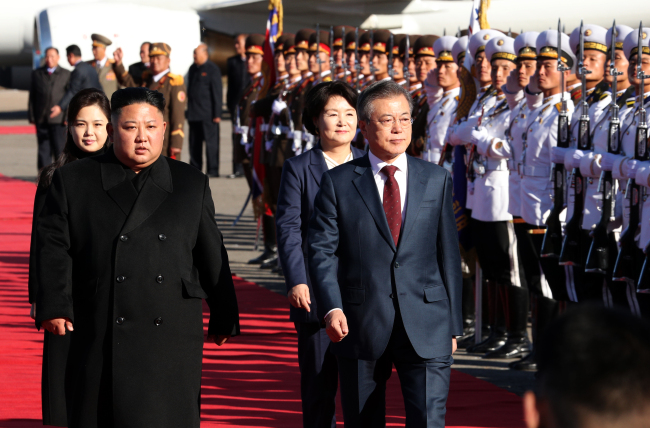Summit puts NK denuclearization back on track, eases cross-border tensions
By Yoon Min-sikPublished : Sept. 20, 2018 - 17:02
South Korean President Moon Jae-in on Thursday wrapped up his three-day visit to North Korea, marked by two meetings with North Korean leader Kim Jong-un and signs that Pyongyang and Washington would soon return to the table for denuclearization talks.
After signing the Pyongyang Declaration on Wednesday, Kim said he and Moon had “pledged to make the Joseon (Korean) Peninsula a land of peace without nuclear weapons or nuclear threats,” vowing to take additional steps toward denuclearization. He even agreed to visit Seoul later in the year, which would be unprecedented if realized.

The initial step is the permanent dismantlement of the North’s key missile engine test site and missile launch pad in Tongchang-ri.
Permanently dismantling the Yongbyon nuclear facility -- the symbol of the communist state’s nuclear ambitions -- was on the table as well, albeit under the condition of the US taking “corresponding measures.”
While no major developments were set in motion, experts viewed the summit as a meaningful first step toward denuclearization that is keeping the ongoing momentum alive.
Harry Kazianis, director of defense studies at the Center for the National Interest, said while the international community was desperately seeking “dramatic changes” in the North -- the relinquishment of all its missile and nuclear programs -- it was “miraculous” that Wednesday’s agreement had been reached.
Jump-starting the Washington-Pyongyang talks on denuclearization, easing military tensions and improving inter-Korea relations were the three main agenda items for South Korea going into the summit.
On the sidelines of the summit, the defense ministers of the two Koreas signed a military agreement that centers on creating a buffer zone to prevent cross-border hostilities. This includes establishing a “no-fly zone” inside the heavily fortified Demilitarized Zone, suspending military drills near the DMZ and the disputed waters in the West Sea, and disarmament of the Joint Security Area.
Described by the South Korean presidential office as a “de facto nonaggression pact,” the military agreement is considered an important steppingstone to declaring the end of the 1950-53 Korea War. The two Koreas technically remain at war, as the Korean War ended in an armistice.
Measures for the family members separated by the war include a permanent reunion facility in the North’s Kumgangsan area.
The two sides also agreed on cross-border exchanges and economic cooperation, including joint projects within the year to connect railways and roads across the border, the resumption of Kumgangsan tours and reopening of the Kaesong industrial park.
In another notable first, Moon directly mentioned the North’s denuclearization several times, including at his speech Wednesday in front of the 150,000 North Koreans attending the Mass Games performance.
While the two Koreas took a significant first step, the Pyongyang Declaration is missing some of the key demands from the US, such an inventory of its nuclear program.
There was also no mention of the North giving up its stockpile of ballistic missiles and nuclear warheads.
In addition, agreement on economic cooperation cannot be implemented without the lifting of UN sanctions against North Korea.
In response to the Pyongyang Declaration, US Secretary of State Mike Pompeo invited his North Korean counterpart, Ri Yong-ho, to meet next week at the UN General Assembly, a move that would restart the denuclearization talks between Pyongyang and Washington.
Neighboring countries China, Japan and Russia also welcomed the outcome of the inter-Korean summit -- particularly the easing of military tensions and the promotion of peace talks and denuclearization.
By Yoon Min-sik and Joint Press Corps (minsikyoon@heraldcorp.com)










![[Hello India] Hyundai Motor vows to boost 'clean mobility' in India](http://res.heraldm.com/phpwas/restmb_idxmake.php?idx=644&simg=/content/image/2024/04/25/20240425050672_0.jpg&u=)








